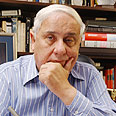
The Jerusalem dispute
Jerusalem’s expansion, Israeli declarations provoke Palestinian reaction
Jerusalem Day, marked here in grand style last week, is an excellent opportunity for second-rate leaders and politicians to make a name for themselves with their loyalty to the State of Israel, Zionism, the Jewish people, and of course, Jerusalem. Had Jerusalem Day not been invented after the Six-Day War, we would have to urgently come up with the notion of adding yet another holiday to the list of Israeli holidays.
Jerusalem Day prompts politicians to come up with their best poetry, which they keep in their hearts for the rest of the year: My Jerusalem, you’re always in our hearts, the eternal city, the eternal capital of the Jewish people, the city of peace, and so on and so forth.
The truth is that one needs to be far removed from Judaism and the Israeli experience, as well as an ignoramus when it comes to the Jewish people’s history, to view Jerusalem as no more than another site in the Holy Land. After all, it’s the city that is mentioned hundreds of times in the Jewish people’s constitutive document (known as the Bible,) and the essence of our existence and life for 2,000 years of exile was expressed through longing for it.
Does anyone really need a proof of the Jewish people’s title deed for the city? Come on!
However, as we know, at least one more party claims ownership of Jerusalem – the Palestinian Authority – and it raises a hue and cry over it. This is not the time or place to discuss the history of the Palestinians in Jerusalem, but rather, to ask the following question: How is it that the Palestinians have presented the partition of Jerusalem as a condition for a deal with them in recent years? What or who aroused them from their stupor? Why were they silent up until a few years ago?
My own answers are as follows: The expansion of Jerusalem’s municipal borders and the inclusion of Palestinian neighborhoods and villages within these limits, coupled with the loud promotion of the Jerusalem issue in a way that is intolerable for Palestinian ears are among the reasons (and I stress; “among”).
In love with our own festivals
Only 20 days after the Six-Day War, and still under the euphoria of the rare and incredible military victory, the government expanded Jerusalem’s municipal limits by another 64,000 dunams, which included 28 Palestinian villages. These expansions grew larger as result of massive Israeli construction and the hunger for additional Arab neighborhoods and communities. In some rare moments of humor, it was said that Jerusalem’s borders reach the outskirts of Tel Aviv.
For dozens of years, Jerusalem expanded, doubled its territory, and built neighborhoods despite the displeasure of the Palestinians, and in the face of American winks; the Americans did not like what they were seeing, but they kept silent.
The need, mostly by rightists, to display ownership, present achievements, and show the world (and mostly the Americans and Palestinians) that we disregard them, prompted the portrayal of Jerusalem as a impenetrable bone of contention, mostly in recent times. Does anyone remember the Americans or Palestinians ever raising loud public question marks over construction in Ramot Eshkol or Ramat Shlomo, which have become an inseparable part of Jerusalem?
The second reason for the growing American and Palestinian attention to Jerusalem is our own joy. We are so much in love with our own festivals, with the hundreds of ceremonies and thousands of declarations; the politicians around here know that a few words uttered about Jerusalem do wonders for the Israeli soul, so they constantly make statements about the united Jerusalem, for eternity, and virtually force the Palestinians to respond and to reject; that is, to tell us: “forget about it.”
Jerusalem is on the operating table at this time. Should the talks with the Palestinians resume, we’ll hear about it more and more, and then we’ll know whether Jerusalem will cry or laugh.
Indeed, the possibility of discussing Jerusalem’s partition was raised back in the Oslo Accords (1993) and even more so in the Camp David conference (2000,) yet at this point it’s (still?) fully under Israel’s control. My prediction: It will be brought up for discussion and apparently be partitioned one of these days. In any case, it will always be, as noted in the Book of Zechariah (12:3), “a burdensome stone for all people.”










